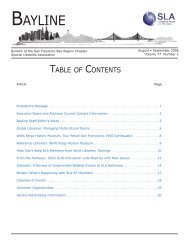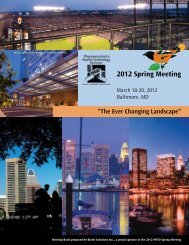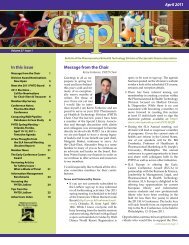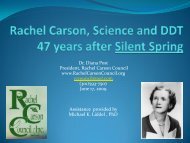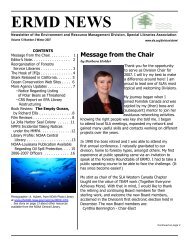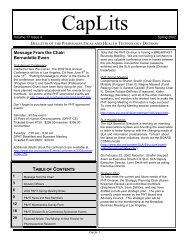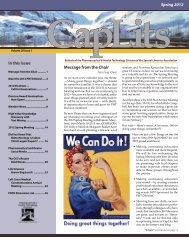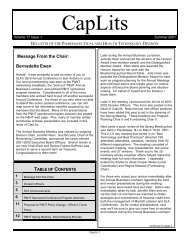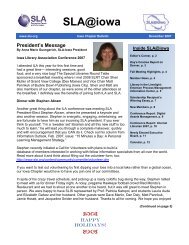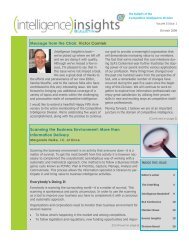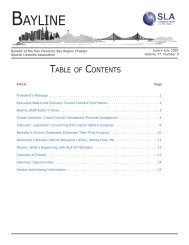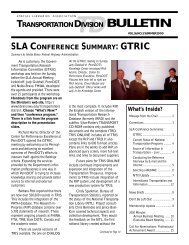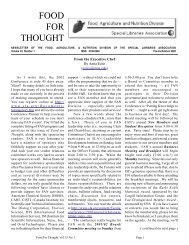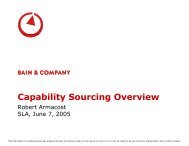Education Libraries - Special Libraries Association
Education Libraries - Special Libraries Association
Education Libraries - Special Libraries Association
You also want an ePaper? Increase the reach of your titles
YUMPU automatically turns print PDFs into web optimized ePapers that Google loves.
throughout the undergraduate teacher preparation<br />
program at BGSU. After closely examining the<br />
undergraduate and graduate level curriculum, it<br />
was evident that there was more flexibility in the<br />
graduate curriculum to absorb a new course<br />
offering and ultimately take information literacy<br />
skills development to the next level.<br />
Since BGSU offers a Masters in <strong>Education</strong>, it<br />
seemed the perfect place to suggest an elective,<br />
stand-alone course devoted to information literacy.<br />
The rationale was that teacher practitioners would<br />
already possess relevant classroom experience,<br />
established teaching practices and be interested in<br />
creating new research activities to enhance their<br />
teaching as well as their students’ learning<br />
experiences. Additionally, with the shortage of<br />
certified school library media specialists in many<br />
school districts around the state, there was a need<br />
to empower classroom teachers with the<br />
knowledge, skills, and abilities to teach<br />
information seeking behaviors. Three to four<br />
sections of the course are offered over six weeks<br />
during the summer session. Instructors are<br />
librarians within the BGSU University <strong>Libraries</strong><br />
system and are uniquely qualified to design and<br />
deliver course material. Instructor experience<br />
includes undergraduate degrees in education,<br />
graduate degrees in education, and successful<br />
PreK-16 teaching experience. Given the complex<br />
nature of the cooperative library system in the<br />
state of Ohio, it is critical that academic librarians<br />
with a solid understanding of each of the three<br />
systems maintain the responsibility for teaching<br />
this course. It is a full-time job keeping abreast of<br />
the changes in these cooperatives, a responsibility<br />
that would be overwhelming for an education<br />
faculty member to handle.<br />
The course description<br />
builds upon the definition<br />
of information literacy as<br />
the ability to locate,<br />
evaluate and effectively use<br />
information resources as<br />
fundamental for student<br />
success in grades PreK-12<br />
and beyond. The course<br />
focuses on examining and<br />
promoting lifelong<br />
information literacy skills and instructional<br />
models useful when crafting effective research<br />
assignments. Students explore online, print and<br />
non-print information resources available in<br />
public, school and academic settings. Emphasis is<br />
placed on critical thinking, resource analysis,<br />
standards research (local, state and national in<br />
scope) and the ethical use of information.<br />
Readings, skills mastered and activities explored<br />
in this course logically transfer to research<br />
projects in subsequent graduate courses and<br />
extend to real-life applications in the PreK-12<br />
classroom.<br />
Student learning outcomes for the course<br />
include the following components:<br />
• Students will gain an understanding of the<br />
organizational structure of print, non-print<br />
and electronic information resources.<br />
• Students will be able to determine the<br />
scope of an information tool during the<br />
selection process.<br />
• Students will explore and master the<br />
intricacies of search strategies for<br />
application in any research environment.<br />
• Students will be able to create effective<br />
learning experiences for PreK-12 students<br />
that integrate the research process into the<br />
curriculum.<br />
About the Course<br />
Ohio has a complex system of multiple library<br />
cooperatives that consist of three divisions: public,<br />
PreK-12, and higher education. The public library<br />
cooperative is called the Ohio Public Library<br />
Information Network (OPLIN, 2007). The PreK-<br />
12 system is known as The Information Network<br />
for Ohio Schools, INFOhio<br />
(2008) and the system for<br />
higher education is known as<br />
the Ohio Library and<br />
Information Network<br />
(OhioLINK, 2008). Although<br />
there is some cooperation and<br />
resource sharing among these<br />
three entities, the mission of<br />
each is specifically geared<br />
towards the needs of their<br />
respective populations.<br />
<strong>Education</strong> <strong>Libraries</strong>, Volume 31, No. 2, Winter 2008 13



